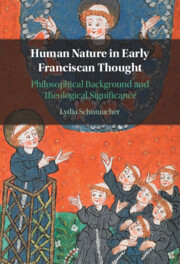Book contents
- Human Nature in Early Franciscan Thought
- Human Nature in Early Franciscan Thought
- Copyright page
- Dedication
- Contents
- Acknowledgements
- Key to Summa Halensis Citations
- List of Abbreviations
- Introduction
- 1 The Philosophy of the Soul c.1150–1215
- 2 Theological Background
- 3 The Soul and the Body
- 4 The Powers of the Soul
- 5 Cognitive Powers
- 6 Cognitive Powers in John of La Rochelle’s Summa de anima
- 7 The Reception of Averroes in Early Scholasticism
- 8 Cognitive Powers
- 9 The Affections
- 10 Free Choice
- 11 Angels
- 12 Conclusion
- Bibliography
- Index
7 - The Reception of Averroes in Early Scholasticism
Published online by Cambridge University Press: 27 January 2023
- Human Nature in Early Franciscan Thought
- Human Nature in Early Franciscan Thought
- Copyright page
- Dedication
- Contents
- Acknowledgements
- Key to Summa Halensis Citations
- List of Abbreviations
- Introduction
- 1 The Philosophy of the Soul c.1150–1215
- 2 Theological Background
- 3 The Soul and the Body
- 4 The Powers of the Soul
- 5 Cognitive Powers
- 6 Cognitive Powers in John of La Rochelle’s Summa de anima
- 7 The Reception of Averroes in Early Scholasticism
- 8 Cognitive Powers
- 9 The Affections
- 10 Free Choice
- 11 Angels
- 12 Conclusion
- Bibliography
- Index
Summary
This chapter intervenes in a longstanding debate about the origins of a psychological schema that is found in both of John’s works on the soul as well as in the Summa Halensis. This is the distinction between the material intellect, which is connected to the body, on the one hand, and the agent and possible intellects, which are separable from the body, on the other. Some past scholars have traced this scheme to Averroes’ distinction between a corruptible and an incorruptible intellect, while others have pointed out that there is insufficient evidence of Averroes’ influence at this time to support that attribution. The chapter gathers evidence which suggests that the scheme is a Latin scholastic invention which draws primarily on Avicenna and Aristotle rather than Averroes.
- Type
- Chapter
- Information
- Human Nature in Early Franciscan ThoughtPhilosophical Background and Theological Significance, pp. 182 - 204Publisher: Cambridge University PressPrint publication year: 2023

